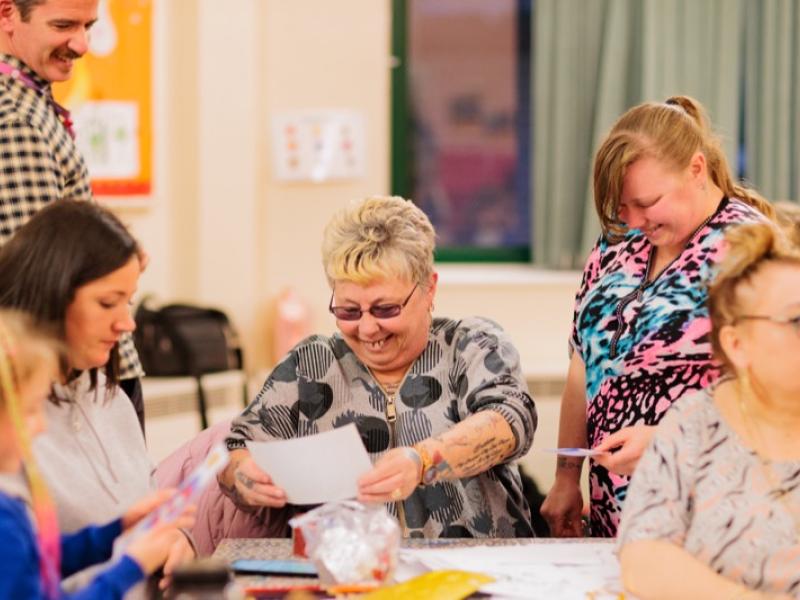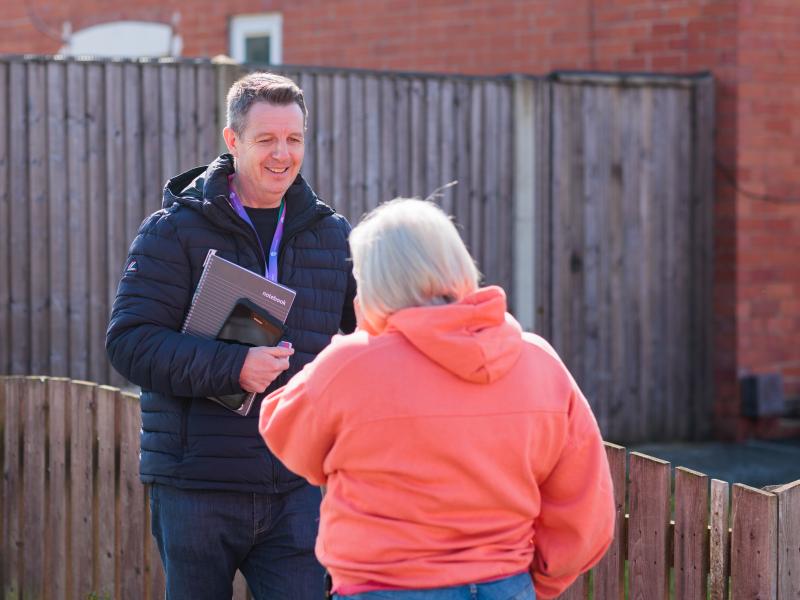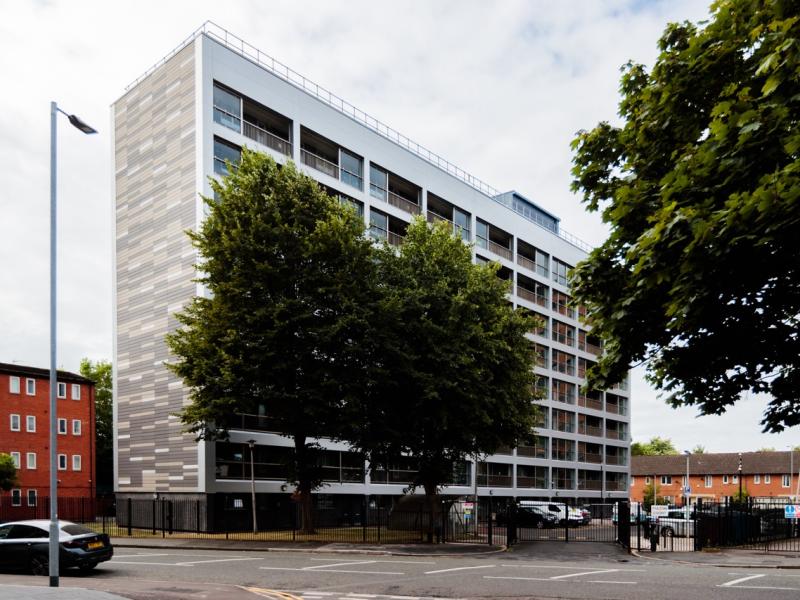Community safety
Our Community Safety team work hard to support you to feel safe and secure in your homes.
Keeping you safe in your home
We believe where you live should be a safe and peaceful place. Instances of anti-social behaviour can seriously impact your quality of life, so our team is committed to working with you and your community to address any issues as soon as possible.

What are your obligations as a customer?
Your tenancy agreement is a good starting point to understand what our customers can and cannot do when living in our properties. Customers are responsible for their actions not only in their own home but also in communal areas and the surrounding community. It’s all about being respectful to neighbours, visitors and people doing their daily tasks and work, and treating people as we would expect to be treated ourselves.
We believe living in a safe and peaceful community means being understanding and friendly with those around us, so we encourage our customers to build positive relationships with their neighbours where possible.
We also ask our customers to be respectful and considerate to our One Manchester colleagues, who are working hard to give you the best possible service.
What is anti-social behaviour?
Anti-social behaviour is defined as any action by a person which causes or is likely to cause harassment, alarm or distress to another person or people. It can be:
- Personal – when a person targets a specific individual or group
- Nuisance – when a person causes trouble, annoyance or suffering to a community
- Environmental – when a person’s actions affect the wider environment, such as public spaces or buildings
Support available
Our Community Safety team is on hand to help you with any nuisance or anti-social behaviour you may experience in or around your home. The team can help you with everything from noise complaints and drug-related cases to issues of harassment, threats and domestic abuse.
As your landlord we have a responsibility to fully investigate and take action when you report anti-social behaviour.
What are examples of ASB?
- Hate crimes and hate incidents
- Use or threatened use of violence
- Repeated abusive language or behaviour
- Harassment
- Damage to property
- Domestic abuse and violence

How we can help if you’re experiencing anti-social behaviour
We encourage you to talk about your concerns with your Neighbourhood Officer in the first instance. Your Neighbourhood Officer will refer you to our Community Safety team if they’re unable to support you with your situation themselves.
Alternatively, you can call us on 0330 355 1000 or fill in our contact us form.
What action can you expect from our Community Safety team?
- Reports related to threats of or actual violence occurring at the time will be responded to within 24 working hours
- All other reports will be responded to within five working days
Please be assured that all contacts will be dealt with confidentially and your identity will not be revealed. If you are being affected by persistent and unreasonable noise or anti-social behaviour, please contact your Neighbourhood Officer.
How to report other problems
Parking issues
Please respectfully approach your neighbour to discuss your concerns, or if someone is illegally parking or blocking access, please contact Greater Manchester Police by calling 101.
Noise concerns
If you’re concerned about normal noise issues such as pets barking or children playing, please discuss with your neighbour before reporting your concerns.
Drug taking
If you’re worried about drug use and drug dealing by residents or neighbours, please call Greater Manchester Police on 101 or 999 if the issue is urgent.
Prostitution concerns
If you’re worried about prostitution taking place in your neighbourhood, please call Greater Manchester Police on 101 or 999 if the issue is urgent.
You can also anonymously report these issues to Crimestoppers by calling 0800 555 111. Crimestoppers is an independent charity not associated with the police.

What isn't anti-social behaviour?
Some noise in and around your home is a normal part of everyday life, whether its carrying out household tasks or due to young children. However, this isn’t considered anti-social behaviour and is therefore not something our team can help with. Some examples are:
- Neighbours carrying out DIY in and around their home during daytime hours e.g. drilling or mowing their lawn
- Noises from babies and children playing
- Normal sounds from your neighbours such as footsteps and talking
Anti-social behaviour case review
If you’re unhappy with the outcome of our ASB investigation, or you’ve repeatedly reported an ASB issue to us and we haven’t taken any action to resolve it, you can apply for the ASB Case Review, this will enable you to request a multi-agency (Including the council, police and housing provider) review of your ASB case (if certain thresholds are met). As a registered provider of social housing, we’re required to cooperate with the process as defined in the Act.
What is the threshold for activating an ASB case review?
Three or more complaints made to us in the previous six-month period;
- The regularity of the antisocial behaviour
- The harm, or potential harm, caused by the antisocial behaviour
- The adequacy of response to the antisocial behaviour by us
You should only use the case review if we haven’t already taken any action as a result of you repeatedly reporting the ASB issue to us.
What's the process for requesting an ASB case review?
Applying for or activating the ASB case review does not interfere with your right to follow our internal complaints/anti-social behaviour procedure. Both processes can run at the same time.
You can read more about the ASB case review in Sections 104 and 105 of the Antisocial Behaviour, Crime and Policing Act 2014.
Hate crime
A hate crime incident is a verbal or physical incident where the victim, or anyone else, feels it was based on someone’s prejudice towards them because of their race, religion, sexual orientation, disability, or alternative sub-culture (the way they dress or their lifestyle).
One Manchester is a hate crime reporting centre and we can help you with the reporting process and offer support. You don’t have to be a One Manchester customer to report hate crimes to us. We respond to hate crime reports within one working day. We attend a Hate Crime Steering group with our partners across Manchester to discuss reporting trends and statistics and share information.
We're here to help
Call 999 if you’re reporting a crime that’s in progress or if someone is in immediate danger. If it isn't an emergency, you can contact Greater Manchester Police by calling them on 101 or reporting on their website: Hate crime | Greater Manchester Police (gmp.police.uk). If you wish to anonymously report a hate crime, visit Report-It. True Vision is a reporting platform set up by the National Police Chiefs’ Council, which allows you to remain anonymous if you choose to and your report will be passed on to GMP.
Alternatively, you can report a hate crime directly to One Manchester by submitting our contact us form or by calling 0330 355 1000 and asking to speak to a member of our Community Safety team.
Tenancy Fraud
Tenancy fraud can include a person not using one of our properties as their main home, selling keys to the property, or allowing people to live there who aren’t entitled to.
We take the safety of our customers very seriously, and it’s vital that social housing is not abused. If you suspect a One Manchester home might be subject to tenancy fraud, contact us on 0330 355 1000 or fill in our contact us form. You can remain anonymous if you wish.
Modern slavery
You might think that slavery is a thing of the past, but sadly it’s a problem that happens in every country around the world, including the UK. Modern slavery can take many forms, but it can be loosely defined as when a person is tricked, coerced, or forced into losing their freedom and then exploited by others for personal or commercial gain.
If you suspect modern slavery is happening in a One Manchester home, talk to your Neighbourhood Officer. Alternatively, you can contact us on 0330 355 1000 and speak to our Community Safety team. You can remain anonymous if you wish.
If you think someone in the property is in immediate danger, call the Greater Manchester Police on 999.

What is cuckooing?
‘Cuckooing‘ is the term used to describe when professional criminals target the homes of vulnerable adults so they can use the property for drug-dealing and other criminal activities.
Victims of ‘cuckooing’ tend to be vulnerable for a range of reasons.
Concerned cuckooing is happening near you?
If you’re worried someone you know may be a victim of cuckooing, or are concerned drug dealing is taking place in a property near you, these are the signs to look out for:
- A sudden increase in the number of coming and goings /people entering and leaving the property
- An increase in cars or bikes outside
- A frequent use of taxis or hire cars from the property
- An increase in anti-social activity in and around the property
- An increase in litter outside the property
- The property becoming sparse of valuable possessions inside, and declining into a state of disrepair
If you believe cuckooing is taking place near you, contact Greater Manchester Police, Crimestoppers on 0800 555 111, or call our Community Safety team on 0330 355 1000.

